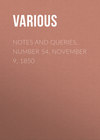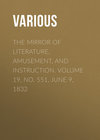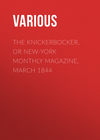Loe raamatut: «Chambers's Edinburgh Journal, No. 443», lehekülg 5
Our conductor now provided himself with a lantern, in order to lead us to the regions under the stage; for, in consequence of the mass of inflammable material connected with a theatre, there are as strict regulations against going about with open lights as in a coal-pit addicted to carbonic acid gas. Descending a trap, we reached the so-called mazarine-floor, a corruption of the Italian mezzanine, from which the musicians have access to the orchestra. It is not much higher than the human stature; and hither descends that Ateista Fulminato, Don Juan, or any other wight unlucky enough to be consigned to the infernal regions until the curtain drops. In this floor is a large apartment for the orchestra, in which are deposited the musical instruments in their cases; and beside it is the so-called pass-room, in which note is taken of the punctual arrival of performers.
Below this is the ground-floor, and below that, again, a vast extent of catacombs. One of these is the rubbish-vault, and this is of considerable size; for although dresses and properties are often made of the coarsest materials, and will not stand a close inspection—the problem to be solved being the combination of stage effect with economy—yet, on the other hand, their want of durability, and the constant production of new pieces, necessarily creates a large amount of waste; and for this accommodation must of course be provided.
Leaving the rubbish-vault, we examined the gasometer, and the remains of gas-works; for Covent Garden made its own gas, until an explosion took place, which suffocated several men. My conductor pointed out to me the spot where they attempted to escape, having gone through a long corridor until they were stopped by a dead wall, now pierced by a door. Near the gasometer is the hydraulic machine for supplying with water the tank on the top of the house; all the other services on this line of pipe are screwed off, and thus the water is forced to the top of the building. In the Queen's Theatre, Haymarket, a supply for the tank on the roof is obtained from a well which was sunk by Mr Lumley under the building, in consequence of the river company having raised his water-rate from L.60 to L.90. From the well, the water is forced up by a machine.
We next ascended a stair, flight after flight; then wound our way through a region of flies and pulleys; and then scrambled up ladders until we arrived at the tank itself, which is large enough to hold sufficient water to supply six engines for half an hour. It has long hose attached to it, ready, at the shortest notice, to have the water directed either over the scenery or the audience part. We now proceeded over the roof of the audience part, to what appeared to be a large well, fenced by a parapet; and looking down ten or twelve feet, saw below us the centre chandelier, the aperture, which would otherwise be unsightly, being closed by an open framework in Arabesque. Through this the chandelier is lighted by a long rod, having at the end a wire, to which is attached a piece of ignited sponge soaked in spirits of wine: the chandelier is raised and lowered at pleasure by a three-ton windlass.
Not less than eighty-five apartments, great and small, surround the stage or adjoin it, and are used as dressing-rooms, workshops, store-rooms, and offices. We first visited the dressing-room of Madame Grisi, nearest the stage, and it had the air of an elegant boudoir, hung and furnished in green and crimson; while another close beside it, fitted up in precisely the same style, was somewhat prematurely called the dressing-room of Mademoiselle Wagner. The dresses of the various performers, we may mention, are supplied by the management; but some of them, with large salaries, and priding themselves on appearing before the public in costly and well-fitting garments, choose to incur this expense themselves.
The sempstresses-room looks exactly like a large milliner's shop, and here we found a forewoman with eighteen assistants at work. Books of costumes are always at hand, so that a degree of historical accuracy is now attained in Opera costume, which materially assists the illusion; and no such anachronism is visible in Covent Garden as in a certain theatre across the Thames, where, instead of the Saracenic minarets of Cairo, this gorgeous Arab city is represented by pyramids, obelisks, and sphynxes. The painting-room of Covent Garden is a light and lofty apartment at the top of the house, and the name of Mr Grieve is a sufficient guarantee both for historical accuracy and artistic character. Scene-painting, as practised at Covent Garden, is a most systematic process: a coloured miniature of each scene is made on Bristol-board, and consigned to an album; then a larger miniature is made, and placed in a model of the Opera stage, on a large table, and from this the scenes themselves are executed. Near the painting-room is the working property-room, filled with carpenters, mechanists, smiths, painters, and other artificers—everything either before or behind the curtain being kept up, repaired, and altered by the people of the establishment.
We now proceeded to hear the rehearsal of the opera of Lucia di Lammermoor, and entering the stalls, found the orchestra full and nearly ready to commence, Mr Costa discussing a glass of port-wine and a sandwich, while the stage-manager was marshalling the people for the first tableau, the principal singers being seated on chairs at the side. What would most have struck those accustomed only to English theatricals, was the respectable appearance of the chorus, so different from the ragamuffin troop that fill up the back-ground of an English scene. The Covent Garden chorus includes, at rehearsal, a considerable number of well-dressed men in shining hats and new paletots, many of whom are good music-teachers, not the less qualified for that business by the opportunities they have in this establishment of becoming familiar with the way in which the best works of the best masters are executed by the best artists.
The rehearsal over, we turned our attention to the audience part of the house, more particularly the Queen's box, of the privacy and splendour of which even old habitués have no idea. In the first place, Her Majesty has a separate court-yard for entrance, in which she may alight, which is a check not only upon obtrusive curiosity on the part of the public, but upon the evil disposed; for although one might naturally suppose, that if there is any individual who ought to enjoy immunity from danger or disrespect, it would be a lady who is exemplary in her public duties as a constitutional sovereign, as well as in those of a consort and mother—experience has shewn the fallaciousness of the idea.
The staircase is very noble, such as few mansions in London possess. Passing through the vestibule, we enter the grand drawing-room, in the centre of which is one of those tables that formed an ornament of the Exhibition last year. The drapery is of yellow satin damask. The principal feature of this drawing-room is the conservatory, which is separated from it by one vast sheet of plate-glass, the gas-light being contrived in such a way as to be unseen by those in the room, although bringing out the colours of the flowers with the greatest brilliancy.
Adjoining the drawing-room is the Queen's dressing-room; and between the grand drawing-room and the royal box is the little drawing-room, the walls of which are hung with blue satin damask, relieved by rich gilt ornaments, mouldings, and bronzes, in the style of Louis Quinze. The royal box itself is fitted up with crimson satin damask, a large arm-chair at the extreme right of the front of the box being the one Her Majesty usually occupies; but when she visits the theatre in state, fourteen boxes in the centre of the house, overlooking the back of the pit, are opened into one, involving a large amount of expense and trouble, which, however, is no doubt amply compensated by the extraordinary receipts of the night.
A private and separate entrance is not the exclusive privilege of royalty. The Duke of Bedford, as ground-landlord, and Miss Burdett Coutts, who has likewise a box in perpetual freehold, have separate entrances, just under that of the Queen's box, with drawing-rooms attached, which are small and low-roofed, but sumptuously fitted up. Such were the principal objects appertaining to the audience part of the house.
Returning behind the scenes, the two principal public rooms are the manager's room and green-room, which both suggested recollections of old Covent Garden in its British drama-days. Unlike the audience part of the theatre, which has been entirely reconstructed, the stage part has only been refurnished—and yet not entirely refurnished—for in this very manager's room, where John Kemble used to play the potentate off the stage with as much dignity as on it, stands a clock with the following inscription: 'After the dreadful fire of Covent Garden Theatre, on the morning of September the 21st 1808, this clock was dug out of the ruins by John Saul, master-carpenter of the theatre, and repaired and set to work.' When we reached the green-room itself, what recollections crowded on me of the stars that glittered around the Kemble dynasty! In Costa, seated at the pianoforte, I saw the face of an honest man, who unites dogged British perseverance and energy with the Italian sense of the beautiful in art. A feeling of regret, however, came over me, to think that our British school of dramatic representation and dramatic literature, which dawned brightly under Elizabeth, and in the eighteenth century was associated with everything distinguished in polite letters and polite society, should have become all but extinct. But this feeling was momentary, when I reflected that our sense of the beautiful, including the good and the true, had not diminished, but had merely gone into new channels; and, more especially, that Meyerbeer and Rossini, in order to hear their own incomparable works executed in perfection, must come to the city which the Exhibition of last year has indelibly stamped as the capital of the civilised world.
NUMBER TWELVE
When I was a young man, working at my trade as a mason, I met with a severe injury by falling from a scaffolding placed at a height of forty feet from the ground. There I remained, stunned and bleeding, on the rubbish, until my companions, by attempting to remove me, restored me to consciousness. I felt as if the ground on which I was lying formed a part of myself; that I could not be lifted from it without being torn asunder; and with the most piercing cries, I entreated my well-meaning assistants to leave me alone to die. They desisted for the moment, one running for the doctor, another for a litter, others surrounding me with pitying gaze; but amidst my increasing sense of suffering, the conviction began to dawn on my mind, that the injuries were not mortal; and so, by the time the doctor and the litter arrived, I resigned myself to their aid, and allowed myself, without further objection, to be carried to the hospital.
There I remained for more than three months, gradually recovering from my bodily injuries, but devoured with an impatience at my condition, and the slowness of my cure, which effectually retarded it. I felt all the restlessness and anxiety of a labourer suddenly thrown out of an employment difficult enough to procure, knowing there were scores of others ready to step into my place; that the job was going on; and that, ten chances to one, I should never set foot on that scaffolding again. The visiting surgeon vainly warned me against the indulgence of such passionate regrets—vainly inculcated the opposite feeling of gratitude demanded by my escape: all in vain. I tossed on my fevered bed, murmured at the slowness of his remedies, and might have thus rendered them altogether ineffectual, had not a sudden change been effected in my disposition by another, at first unwelcome, addition to our patients. He was placed in the same ward with me, and insensibly I found my impatience rebuked, my repinings hushed for very shame, in the presence of his meek resignation to far greater privations and sufferings. Fresh courage sprang from his example, and soon—thanks to my involuntary physician—I was in the fair road to recovery.
And he who had worked the charm, what was he? A poor, helpless old man, utterly deformed by suffering—his very name unnoticed, or at least never spoken in the place where he now was; he went only by the appellation of No. 12—the number of his bed, which was next to my own. This bed had already been his refuge during three long and trying illnesses, and had at last become a sort of property for the poor fellow in the eyes of doctors, students, nurse-tenders, in fact, the whole hospital staff. Never did a gentler creature walk on God's earth: walk—alas! for him the word was but an old memory. Many years before, he had totally lost the use of his legs; but, to use his own expression, 'this misfortune did not upset him:' he still retained the power of earning his livelihood, which he derived from copying deeds for a lawyer at so much per sheet; and if the legs were no longer a support, the hands worked at the stamped parchments as diligently as ever. But some months passed by, and then the paralysis attacked his right arm: still undaunted, he taught himself to write with the left; but hardly had the brave heart and hand conquered the difficulty, when the enemy crept on, and disabling this second ally, no more remained for him than to be conveyed once more, though this time as a last resource, to the hospital. There he had the gratification to find his former quarters vacant, and he took possession of his old familiar bed with a satisfaction that seemed to obliterate all regret at being obliged to occupy it again. His first grateful accents smote almost reproachfully on my ear: 'Misfortune must have its turn, but every day has a to-morrow.'
It was indeed a lesson to witness the gratitude of this excellent creature. The hospital, so dreary a sojourn to most of its inmates, was a scene of enjoyment to him: everything pleased him; and the poor fellow's admiration of even the most trifling conveniences, proved how severe must have been his privations. He never wearied of praising the neatness of the linen, the whiteness of the bread, the quality of the food; and my surprise gave place to the truest pity, when I learned that, for the last twenty years, this respectable old man could only afford himself, out of the profits of his persevering industry, the coarsest bread, diversified with white cheese or vegetable porridge; and yet, instead of reverting to his privations in the language of complaint, he converted them into a fund of gratitude, and made the generosity of the nation, which had provided such a retreat for the suffering poor, his continual theme. Nor did his thankful spirit confine itself to this. To listen to him, you would have believed him an especial object of divine as well as human benevolence—all things working for his good. The doctor used to say, that No. 12 had 'a mania for happiness;' but it was a mania that in creating esteem for its victim, infused fresh courage into all that came within its range.
I think I still see him seated on the side of his bed, with his little black silk cap, his spectacles, and the well-worn volume, which he never ceased perusing. Every morning, the first rays of the sun rested on his bed, always to him a fresh subject of rejoicing and thankfulness to God. To witness his gratitude, one might have supposed that the sun was rising for him alone.
I need hardly say, that he soon interested himself in my cure, and regularly made inquiry respecting its progress. He always found something cheering to say—something to inspire patience and hope, himself a living commentary on his words. When I looked at this poor motionless figure, those distorted limbs, and, crowning all, that smiling countenance, I had not courage to be angry, or even to complain. At each painful crisis, he would exclaim: 'One minute, and it will be over—relief will soon follow. Every day has its to-morrow.'
I had one good and true friend—a fellow-workman, who used sometimes to spare an hour to visit me, and he took great delight in cultivating an acquaintance with No. 12. As if attracted by a kindred spirit, he never passed his bed without pausing to offer his cordial salutation; and then he would whisper to me: 'He is a saint on earth; and not content with gaining Paradise himself, must win it for others also. Such people should have monuments erected to them, known and read of all men. In observing such a character, we feel ashamed of our own happiness—we feel how comparatively little we deserve it. Is there anything I can do to prove my regard for this good, poor No. 12?'
'Just try among the bookstalls,' I replied, 'and find the second volume of that book you see him reading. It is now more than six years since he lost it, and ever since, he has been obliged to content himself with the first.'
Now, I must premise that my worthy friend had a perfect horror of literature, even in its simplest stages. He regarded the art of printing as a Satanic invention, filling men's brains with idleness and conceit; and as to writing—in his opinion, a man was never thoroughly committed, until he had recorded his sentiments in black and white for the inspection of his neighbours. His own success in life, which had been tolerable—thanks to his industry and integrity—he attributed altogether to his ignorance of those dangerous arts; and now a cloud swept across his lately beaming face as he exclaimed: 'What! the good creature is a lover of books? Well, we must admit that even the best have their failings. No matter. Write down the name of this odd volume on a slip of paper; and it shall go hard with me, but I give him that gratification.'
He did actually return the following week with a well-worn volume, which he presented in triumph to the old invalid. He looked somewhat surprised as he opened it; but our friend proceeding to explain that it was at my suggestion he had procured it in place of the lost one, the old grateful expression at once beamed up in the eyes of No. 12; and with a voice trembling with emotion, he thanked the hearty giver.
I had my misgivings, however; and the moment our visitor turned his back, I asked to see the book. My old neighbour reddened, stammered, and tried to change the conversation; but, forced behind his last intrenchments, he handed me the little volume. It was an old Royal Almanac. The bookseller, taking advantage of his customer's ignorance, had substituted it for the book he had demanded. I burst into an immoderate fit of laughter; but No. 12 checked me with the only impatient word I ever heard from his lips: 'Do you wish our friend to hear you? I would rather never recover the power of this lost arm, than deprive his kind heart of the pleasure of his gift. And what of it? Yesterday, I did not care a straw for an almanac; but in a little time it is perhaps the very book I should have desired. Every day has its to-morrow. Besides, I assure you it is a very improving study: even already I perceive the names of a crowd of princes never mentioned in history, and of whom up to this moment I have never heard any one speak.'
And so the old almanac was carefully preserved beside the volume of poetry it had been intended to match; and the old invalid never failed to be seen turning over the leaves whenever our friend happened to enter the room. As to him, he was quite proud of its success, and would say to me each time: 'It appears I have made him a famous present.' And thus the two guileless natures were content.
Towards the close of my sojourn in the hospital, the strength of poor No. 12 diminished rapidly. At first, he lost the slight powers of motion he had retained; then his speech became inarticulate; at last, no part obeyed his will except the eyes, which continued to smile on us still. But one morning, at last, it seemed to me as if his very glance had become dim. I arose hastily, and approaching his bed, inquired if he wished for a drink; he made a slight movement of his eyelids, as if to thank me, and at that instant the first ray of the rising sun shone in on his bed. Then the eyes lighted up, like a taper that flashes into brightness before it is extinguished—he looked as if saluting this last gift of his Creator; and even as I watched him for a moment, his head fell gently on the side, his kindly heart ceased to beat. He had thrown off the burden of To-day; he had entered on his eternal To-morrow.




















